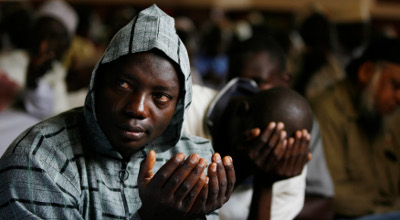Former Muslim Extremist in Uganda Flees Wrath of Ex-Colleagues
A former member of a Muslim extremist group in Uganda who converted to Christianity is in hiding in Kenya, his movements severely restricted following threats to kill him.
Hassan Sharif Lubenga, 54, was a sheikh and member of the Buk Haram, a violent group of Islamists whose name suggests the Bible is corrupt and therefore forbidden. Originally from Chengera, seven kilometers from Kampala, the husband to four wives began his conversion process four years ago; in June 2011, he said, after various dreams and visions in which Jesus appeared to him, he made a full commitment to follow Christ.
Lubenga fled to Kenya last July 10 after hostilities peaked, and upon returning to Uganda in September he received messages on his cell phone from mujahidin—Islamic fighters—threatening to kill him, he said. He reported the threats to Chengera police, who told him they would investigate, but in October a friend told him that he’d heard in a Chengera mosque that his former colleagues were enraged and planning to kill him.
“My heart got troubled, but the voice of Jesus continued whispering to me to witness for Jesus without fear,” Lubenga said.
When Lubenga felt like giving up on his new faith, he said, he received a call from Bishop Umar Mulinde, his former pastor at Gospel Life Church International who was scarred in a Christmas Eve acid attack by Muslim extremists. Mulinde told him the church was praying for him, and Lubenga was deeply heartened, he said.
“All my family members have deserted me,” he said by telephone. “The Muslims are looking to kill me. I need protection and help.”
The Islamic extremists who had declared war on “infidels” such as Lubenga had been threatening him since 2007, when he first began to speak of dreams and visions of Christ. Dangers peaked in 2010, when Muslims saw him visiting a church in Uganda. By April 2010, one of his four wives had poisoned him because of his budding faith in Christ, leaving him unconscious, he said. After his recovery, he fled Chengera to a village 25 kilometers from Kampala, Kiwangala.
In 2007, he said, he told his Muslim jihadist friends that he had seen Jesus in a dream. He said they had warned him, “Do not make such a mistake again—we are ready to help you. If you continue with this move, then we will destroy you. You know that you are a sheikh.”
He reported the threats to police at Insanje sub-county, Wakizo district, angering his colleagues, who sent threatening letters.
“I explained to them that it is Jesus who came to me, and not I who sought Him,” he said. “They were furious. They then kidnapped me and blindfolded me for three days, coupled with beatings. They demanded I deny Jesus as the Son of God, which I consented to because I feared that they were going to kill me.”
In 2009, another message from Jesus came to him in a vision, he said: “Do not hide your Christian faith.”
Within a few months, another threatening letter arrived: “If you do not join Islamic Jihad, then we shall kill you.”
Lubenga decided to go on pilgrimage to Mecca, in accordance with the tenets of Islam. While there, however, he heard another voice, he said: “You have decided to forsake me, and instead you are here to accuse me.”
“I then saw Jesus high up with white robe,” he said. “He laughed. I just left the place but got sick for two weeks. I visited Mohammed Ali, the head of majini [evil spirits], who promised that the majini will come and help me. But I did not receive any healing.”
Jesus continued appearing to him for three months in visions, he said.
“I could not resist, so I decided to believe in Him and started openly declaring that Jesus is my personal Savior,” Lubenga said. “The whole family and clan members were out to destroy me. I was poisoned by my own family.”
His father, Morshid Kabide, came to his house in July 2010 to establish the truth of the rumors he had heard, Lubenga said.
“I heard that nowadays you do go to church, and you are claiming that you saw Jesus,” his father told him. When he answered in the affirmative, reaffirming his decision to follow Jesus, his father was crestfallen; he later committed suicide, leaving a letter that read, “I have decided to kill myself because my son became a Christian” and urged all family members to curse him.
Lubenga said that since then he has been in hiding, growing more terrified as threats intensified.
“But I kept my faith in Jesus,” he said. “I sold some of my belongings to build the church structure at Chengera, outside Kampala.”
As a result of this act, threats on his life grew more shrill, and he fled to Kenya.
Two of his wives had left him in 2007; one has decided to stay with him, and he has been sharing his faith with her. The fourth wife, whom he married five years ago, is a Christian who has also received death threats; six months pregnant, she has fled to an undisclosed location.




























































